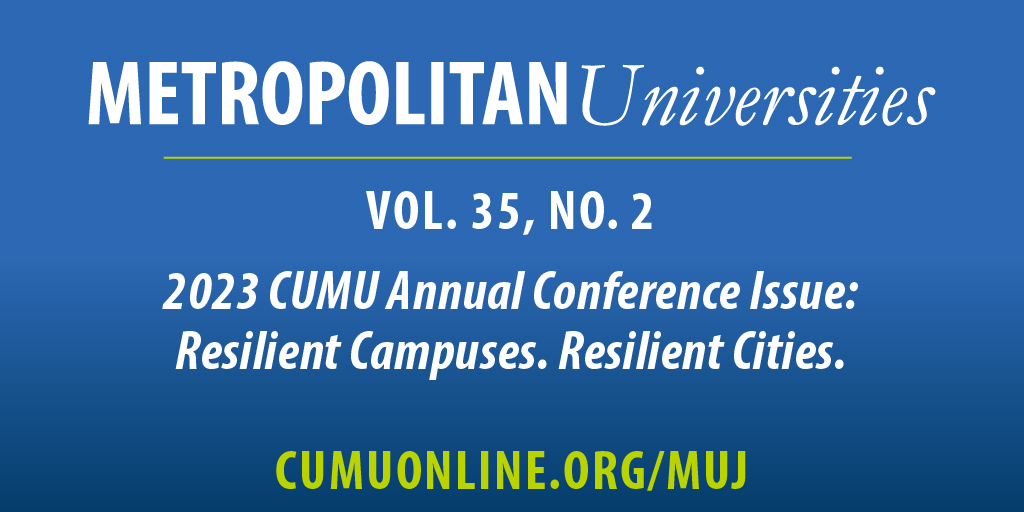Student Support and Retention
College Specific Integration of Social Work Case Management in a Higher Education Setting
DOI:
https://doi.org/10.18060/27713Keywords:
student support, social work, case management, college student retentionAbstract
Traditional student support services offered by universities are broad and varied; however, many of these fall under either student or academic affairs and are located centrally on campus. Offering a decentralized, college-specific model of student support and retention that partners with both academic and student affairs allows for a holistic, integrated approach to student resources that is easily accessed within a student’s own academic area. UA Little Rock has implemented this innovative model by housing a licensed social worker in each main campus college. These social workers provide case management services ranging from triage of at-risk students to coordination of on-campus and community resources. Each social worker is also able to provide a limited number of small micro-grants as emergency funds. Primary goals of this initiative include increased student use of the case management services, increased faculty referrals, improved student retention, evaluation of interventions, and student satisfaction. Pilot evaluation data indicates that a diverse population of students across multiple disciplines are utilizing these services and that retention rates for students receiving case management services differs based on their presenting issue(s). To support ongoing evaluation of services, there is a need to more clearly standardize data collection without disruption to practice.
References
References
ACPA, & NASPA (2015). Professional Competency Areas for Student Affairs Educators. Retrieved from https://www.naspa.org/images/uploads/main/ACPA_NASPA_Professional_Competencies_FINAL.pdf
Adams, S.D., Hazelwood, S., & Hayden, B. (2014). Student affairs case management: Merging social work theory with student affairs practice. Journal of Student Affairs Research and Practice, 51(4), 446-458. http://dx.doi.org/10.1515/jsarp-2014-0044
Berger, E.J., Lampe, L., & Caruccio, J.I. (2015). Just-in-time support: An evidence-based academic-student affairs partnership to enable engineering student success. (paper ID #12151). 122nd ASEE Annual Conference & Exposition, Seattle, WA. Retrieved on November 27, 2023 from https://peer.asee.org/just-in-time-support-an-evidence-based-academic-student-affairs-partnership-to-enable-engineering-student-success.pdf
Black, L., & Taylor, Z.W. (2021). Higher education case management amid Covid-19: Toward holistic student self-assessment to allocate emergency resources on campus. Community College Journal of Research and Practice, 45(4), 233-237, DOI:
1080/10668926.2021.1883154
Cason, C.L., Bond, M.L., Gleason-Wynn, P., Coggin, C., Trevino, E., & Lopez, M. (2008) Perceived barriers and needed supports for today’s Hispanic students in the health professions: Voices of seasoned Hispanic health care professionals. Hispanic Health Care International, 6(1), 41-50. DOI: 10.1891/1540–4153.6.1.41
Denning, E.C., Brannan, D., Murphy, L.A., Losco, J.A., & Payne, D.N. (2018). Not all roles are the same: An examination between work-family-school satisfaction, social integration, and negative affect among college students. Psi Chi Journal of Psychological Research, 23(2), 166-178. https://doi.org/10.24839/2325-7342.JN23.2.166
Elder, B. L., Jacobs, P., & Fast, Y.J. (2015). Identification and support of at-risk students using a case management model. Journal of Professional Nursing, 31(3), 247-253. https://doi.org/10.1016/j.profnurs.2014.10.003
Evans, W.N., Kearney, M.S., Perry, B., & Sullivan, J.X. (2020). Increasing community college completion rates among low-income students: Evidence from a randomized controlled trial evaluation of a case-management intervention. Journal of Policy Analysis and Management, 39(4), 930–965. DOI:10.1002/pam.22256
Geckeler, C. (2008). Helping community college students cope with financial emergencies: Lessons from the Dreamkeepers and Angel Fund emergency financial aid programs (Report). New York: MDRC. Downloaded May 2019 from https://www.mdrc.org/publication/helping-community-college-students-cope-financial-emergencies.
Goff, A. (2011) Stressors, academic performance, and learned resourcefulness in Baccalaureate nursing students. International Journal of Nursing Education Scholarship, 8(1), 1-20. http://0-dx.doi.org.library.ualr.edu/10.2202/1548-923X.2114
Korn, M. (Oct. 2014). Colleges find micro-grants keep some students from dropping out; Institutions buoy degree attainment by bridging small funding gaps for the financially pressed. Wall Street Journal (On-line). Dow Jones & Co, Inc: New York, NY. Downloaded from https://www.wsj.com/articles/colleges-find-micro-grants-keep-some-students-from-dropping-out-1414604718
Martirosyan, N.M., Bustamante, R.M., & Saxon, D.P. (2019). Academic and social support services for international students: Current practices. Journal of International Students, 9(1), 172-191. DOI: 10.32674/jis.v9i1.275ojed.org/jis
Mas-Exposito, L., Amador-Campos, J.A., Gómez-Benito, J., & Lalucat-Jo, L. (2013). Depicting current case management models. Journal of Social Work, 14(2), 133-146. DOI: 10.1177/1468017313477296
Moreau, M. (2016). Regulating the student body/ies: University policies and student parents. British Educational Research Journal, 42(5): 906–25. DOI: 10.1002/berj.3234
Mthimunya, K.D.T., & Daniels, F.M. (2019). The development and validation of an intervention for the improvement of academic performance and success of nursing students at a university in the Western Cape, South Africa. International Journal of Africa Nursing Sciences, 11, 1-9. DOI:10/1016/j.ijans.2019.100156
National Center for Education Statistics. (2023). Characteristics of postsecondary students. Condition of Education. U.S. Department of Education, Institute of Education Sciences. Retrieved November 2023, from https://nces.ed.gov/programs/coe/indicator/csb.
National Center for Education Statistics. (2022). Postbaccalaureate Enrollment. Condition of Education. U.S. Department of Education, Institute of Education Sciences. Retrieved November 30, 2023, from https://nces.ed.gov/programs/coe/indicator/chb.
Redford, J., & Hoyer, K.M. (2017). First-generation and continuing-generation college students: a comparison of high school and postsecondary experiences. Stats in Brief, U.S. Department of Education (NCES 2018–009). American Institutes for Research. Retrieved November 2023 from https://nces.ed.gov/pubs2018/2018009.pdf
Sallee, M.W., & Cox, R.D. (2019). Thinking beyond childcare: Supporting community college student-parents. American Journal of Education, 125, 621-645. DOI: 10.1086/704094
Van Brunt, B., Ed. (2012). Case management in higher education. National Behavioral Intervention Team Association (NaBITA) and American College Counseling Association (ACCA). Retrieved on December 1, 2023 from https://maui.hawaii.edu/wp-content/uploads/sites/4/2018/09/Case-Managment-in-higher-education.pdf
Downloads
Published
Issue
Section
License
Copyright (c) 2024 Shannon Collier-Tenison, Mia Polk-Hampton

This work is licensed under a Creative Commons Attribution 4.0 International License.



